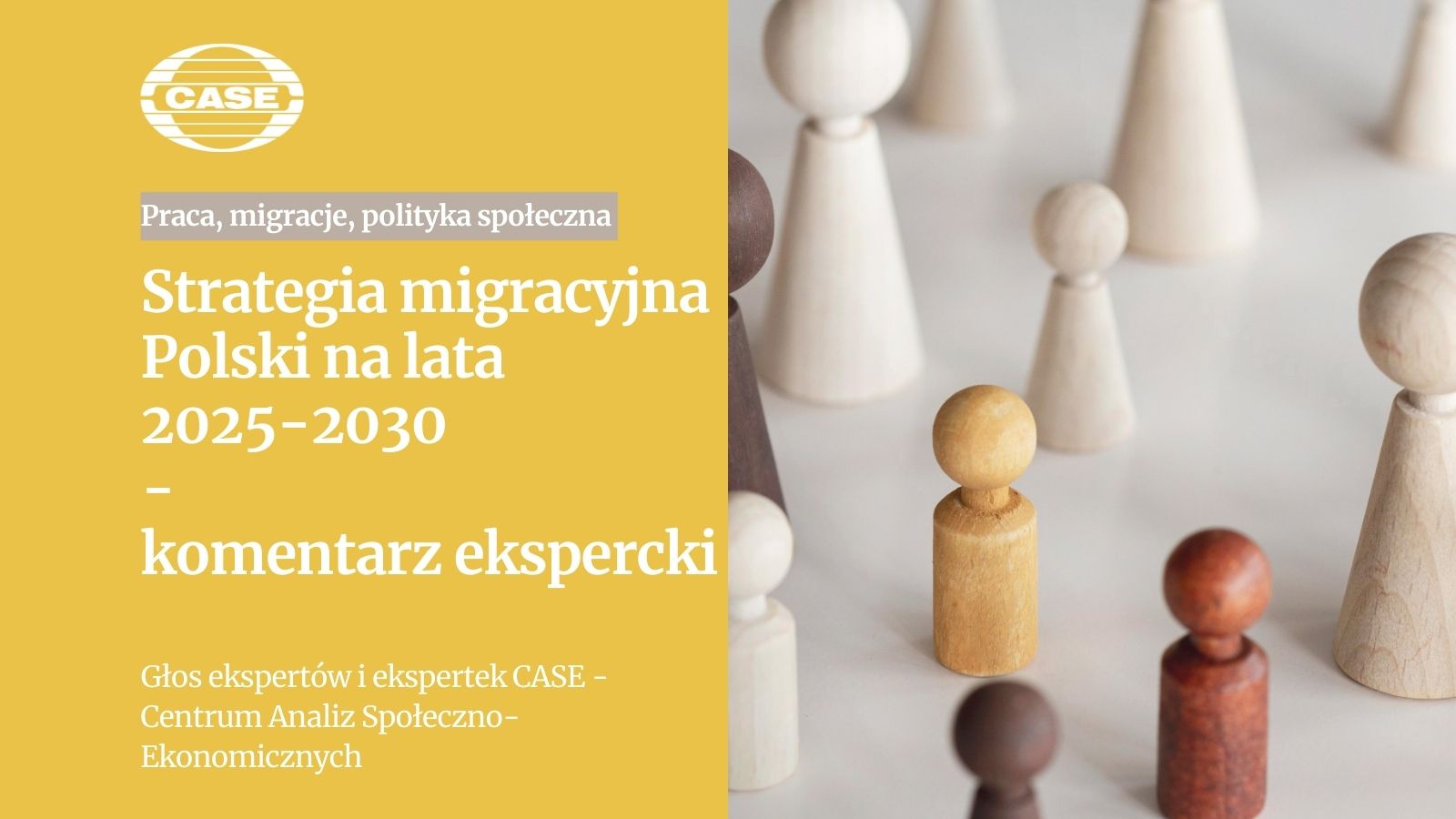 Homepage CASE
Homepage CASE
Selected values

Poland’s Migration Strategy for 2025-2030 – Expert Commentary
-

Jan Bazyli Klakla
Dr. Jan Bazyli Klakla holds doctorates in law and sociology from the Jagiellonian University in Krakow, where he also completed studies in law, sociology, and cultural studies, alongside postgraduate studies in international migration at the University of Warsaw. He is currently a Director of Migration, Social Policy, and Development Cooperation at CASE – Center for Social and Economic Research in Warsaw, and a post-doctoral researcher at the Center for Legal Education and Social Theory at the University of Wrocław. Dr. Klakla has been involved in and has led numerous national and European research projects, including those funded by Horizon Europe, Norway Grants, and Polish National Science Center. His work also includes providing consulting and expert services to key European institutions such as the Committee of the Regions, the European Economic and Social Committee, and CEDEFOP (European Centre for the Development of Vocational Training). He has served as an expert in the “Safe Krakow - Security Strategy for Krakow” program. Dr. Klakla is the editor of Law and Culture. Reconceptualization and Case Studies (Springer Nature, 2021) and the author of Law and Acculturation. Conceptualisation and Empirical Case Study: Slavic Migrants in Poland (Palgrave Macmillan, 2024) and Studying in Times of Crisis. Acculturation and Adaptation of Ukrainian Students at Kraków Higher Education Institutions amidst the COVID-19 Pandemic and Russia's Aggression against Ukraine (Brill, 2025). In recognition of his scholarly contributions, he was awarded first prize in the competition of the Association of the Philosophy of Law and Social Philosophy (IVR) – Polish Section for the best doctoral dissertation in the theory and philosophy of law. His research interests span migration, sociology of law, educational research, public policy analysis, customary law, and the methodology of social sciences.
Articles from this author:
-
Blueprint and Methodology for Innovative Governance
The publication is a key deliverable within the BioBeo project, funded under the Horizon Europe program. It provides a structured approach to integrating bioeconomy education into school curricula across different institutional and social environments. The report examines the actors involved in curriculum decision-making, from policymakers and school administrators to parents, students, and businesses. It categorizes existing procedures for introducing new content into schools, whether initiated by teachers, school heads, or government authorities. Key barriers—legal, organizational, and socio-cultural—are identified, along with strategies to overcome them. A central theme is the importance of inclusive governance in education, advocating for participatory decision-making that involves various stakeholders. Recommendations highlight the need for flexibility in curriculum design, adequate funding, professional support for teachers, and depoliticization of educational content. The report concludes by situating these findings within the broader BioBeo curriculum framework, reinforcing the role of education in fostering a sustainable and circular bioeconomy.
-
178th mBank-CASE Seminar Proceedings: Immigration and the Labour Market in Poland
Over the last dozen years Poland became an immigration country. The 178th mBank-CASE Seminar proceedings is devoted to this process - from various perspectives. The data speak for themselves. Immigration provides significant support for the Polish labour market. Poland is facing a rapid population decline. According to projections by the Ministry of Finance in 2022, by 2030 the population of Poland could decrease from the current 37.75 million to 36.6 million, and by 2050 to 34.1 million. The percentage of people of working age will decrease, while the elderly population will increase. Immigration may provide a solution to this problem. In 2022, around 100,000 people from Belarus arrived in Poland, most of them actively participating in the labour market. In addition, there are 1.2 million Ukrainians who stayed in Poland after Russia's invasion of Ukraine. It is therefore necessary to develop a long-term immigration, education and social policy to retain immigrants and integrate them into society and the labour market. This is what eminent experts who have been researching migration processes for years write about in the first two chapters of these Notebooks: Dr Maciej Duszczyk, as well as Dr Agata Górny and Dr Paweł Kaczmarczyk, from the Centre for Migration Research, operating within the University of Warsaw. The third chapter is devoted to the situation of female domestic workers. Table of Contents Ewa Balcerowicz - Introduction p. 5-6 Maciej Duszczyk - Chapter 1: Factors and conditions in Poland’s transformation into an immigration country p. 7-14 Agata Górny, Paweł Kaczmarczyk - Chapter 2: Immigrants and war refugees from Ukraine on the Polish labour market: opportunities and challenges p. 15-33 Jan Bazyli Klakla - Chapter 3: In the Shadows. Ukrainian Domestic Workers in Poland p. 34-44
-
In the Shadows. Ukrainian Domestic Workers in Poland
We are pleased to present our report, “In the Shadows: Ukrainian Domestic Workers in Poland,” developed in collaboration with CARE International, an organization dedicated to fighting poverty and social inequality. The research focuses on a frequently overlooked topic – the domestic sector and excluded female emigrants working as domestic workers. We conducted our study in … Continued
-
Blueprint and Methodology for Innovative Governance
-

Oskar Chmiel
Oskar Chmiel holds a PhD in Social Sciences with a specialization in Political Science from the University of Wroclaw. He is particularly interested in the political and social aspects of international development cooperation, migration, and trade. Prior to joining CASE, Oskar gained experience working, among others, as an intern at the Polish Centre for African … <a href="https://case.dev10.pro/publications/polands-migration-strategy-for-2025-2030-expert-commentary/">Continued</a>
Articles from this author:
-
V4 Development Cooperation Trialogue: Reinforcing Synergies, Sharing Good Practices
V4 Development Cooperation Trialogue: Reinforcing Synergies, Sharing Good Practices. A Guide to participation in EU development funding The study is the result of V4DevCo project aiming at enhancing knowledge base on participation of V4 non-state development actors in EU development funding programs. The Guide includes a set of recommendations developed with contribution of representatives of … Continued
-
Energy policy and the labour market: consequences for employment in regions undergoing energy transitions
This study examines the socio-economic situation of three lignite regions in the process of transitioning out of coal mining: Lusatia in Germany, Wielkopolska in Poland, and Upper Nitra in Slovakia. It assesses the effectiveness of various instruments, factors and approaches in creating quality jobs, employment, and economic growth. The research results suggest that a successful … Continued
-
Social dialogue TOOLKIT for decent work of migrants and refugees in Poland
Today Poland is dealing with an unprecedented inflow of migrants and refugees. Within less than a month after the outbreak of the war in Ukraine on 24th February 2022, the border with Poland was crossed by over 2 million refugees from that state, who, pursuant to the Act of 12 March 2022 on assistance to … Continued
-
V4 Development Cooperation Trialogue: Reinforcing Synergies, Sharing Good Practices
-

Agnieszka Kulesa
Specialist in Social Sciences
Agnieszka Kulesa has been working at CASE since 2018. She specialises in the labour market, international labour migration, and migration policies within and outside the European Union.
Articles from this author:
-
Exploring the Entrepreneurial Potential of Belarusian Migrants in the EU
This Working Paper aims to deepen the understanding of Belarusian migration to the EU, with a particular focus on entrepreneurship among Belarusian migrants.
-
Intergenerational Dialogue for the Future of My City
The publication is an educator's guidebook designed to inspire and support discussions between youth and elderly participants about shaping the future of urban environments. Created as part of the "Future for All" project by CASE (Center for Social and Economic Research), this guidebook uses Warsaw as a case study but provides adaptable insights for cities globally. It is funded by the European Economic Area and Norwegian Financial Mechanism (2014–2021). The guidebook delves into critical themes, including: Demography: Addressing the implications of an ageing population, declining birth rates, and migration patterns for urban planning and social cohesion. Migration: Exploring the integration of diverse populations and fostering intercultural and intergenerational understanding. Climate Change: Highlighting urban sustainability through public initiatives like green spaces and waste reduction. Digitalisation: Emphasizing smart city development while bridging the generational digital divide. Central to its approach are intergenerational activities that foster collaboration and mutual understanding, with a focus on scenario planning, problem-solving, and community engagement. This resource equips educators with tools to promote critical thinking and inclusivity, encouraging young and older citizens alike to actively shape resilient and sustainable urban communities.
-
177th mBank-CASE Seminar Proceedings: The Just Energy Transition from the Perspective of Cities and Regions – the experience of Poland and other European Union countries
Climate change is a global problem - it requires the cooperation of countries all over the world and the implementation of sustainable development concepts. In mBank-CASE Seminar Proceedings no. 177 authors describe the ways selected Polish regions tackled the challenges of transition towards sustainable energy. Agnieszka Kulesa, Vice-President of CASE Management Board, focuses on Lusatia, Upper Nitra and Greater Poland and the way these regions handled the transition, highlighting the role of lignite mining. Aleksandra Gawlikowska-Fyk, Energy Forum expert and director of the Electricity comments on Agnieszka’s findings. Next chapters focus on the way two cities in Poland managed to make their way through an energy transition: Konin - described by Piotr Korytkowski, Its President, and Wałbrzych - by Andrzej Kosiór, Head of the Strategic Management Office. Table of contents Ewa Balcerowicz - Introduction p. 5-7 Agnieszka Kulesa - The just energy transition in Lusatia (Germany), Upper Nitra (Slovakia) and Greater Poland (Poland) – conclusions and recommendations p. 8-23 Aleksandra Gawlikowska-Fyk - Just Energy Transition in Poland: where we stand p. 24-27 Piotr Korytkowski - Energy transition of Konin and the Konin region p. 25-34 Andrzej Kosiór - Lower Silesia’s energy transition – the experience of Wałbrzych p. 34-42
-
Exploring the Entrepreneurial Potential of Belarusian Migrants in the EU
Related publications
Thanks for joining us!
You're now part of a community that values [your newsletter's focus]. Get ready to stay informed, inspired, and engaged with our carefully curated content.
